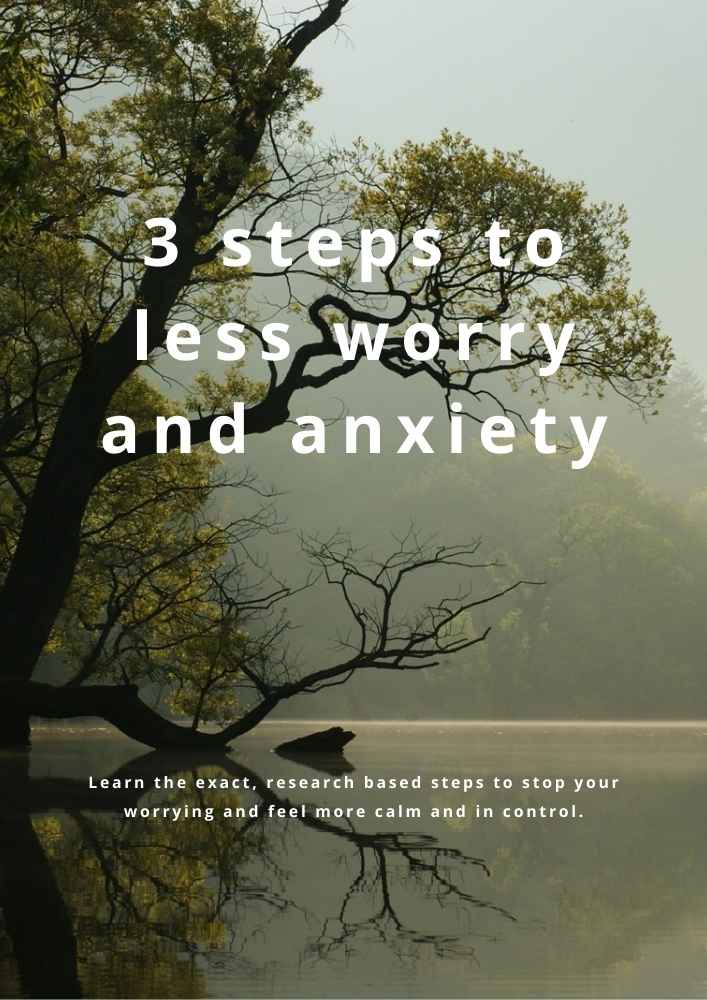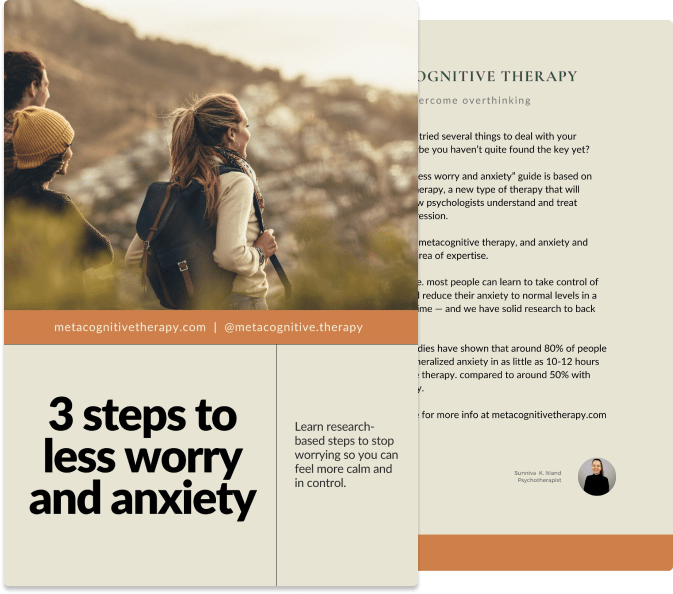Can MCT Help With My Problem?

Download our best tips on reducing anxiety and worrying
Learn three powerful metacognitive therapy steps to stop the worry cycle, reduce anxiety, and feel calmer in everyday life.


If you've explored therapy before, but you didn't feel like it helped resolve your issues, a revolutionary new approach called Metacognitive Therapy (MCT) may be the answer.
There are many types of therapy available today, but figuring out which method is best for you can feel daunting. So how do you know if MCT is the right solution for you?
If you're struggling with your mental health, you might find yourself trapped in a cycle of worry, negative thinking, and monitoring certain feelings and symptoms that traditional therapies haven't successfully addressed.
MCT has proven to be a highly effective treatment for a range of mental conditions. Compared to other types of therapy, it's a short-term treatment, often requiring just 8-12 sessions, making it a very time-efficient choice.
Conditions MCT can address
Metacognitive Therapy is a relatively new method of therapy that's rapidly increasing in popularity. Over the last few years a number of small and large-scale clinical studies were conducted, indicating that MCT is a more effective treatment for a number of mental conditions than today's gold standard methods. These conditions include:
- Generalized anxiety [1]
- Depression [2][3][4][9]
- Obsessive-compulsive disorder (OCD) [5][6]
- Post-traumatic stress disorder (PTSD) [7]
There is also evidence in favor of MCT being a good choice for conditions like social anxiety (SAD), emetophobia (fear of vomiting), excessive alcohol use (AUD), and health anxiety (hypochondriasis) [10][11][12][13].
In the coming years, this list is expected to grow as new and ongoing clinical trials are concluded and the results are evaluated.

Download our best tips on reducing anxiety and worrying
Learn three powerful metacognitive therapy steps to stop the worry cycle, reduce anxiety, and feel calmer in everyday life.
Can MCT help if my problem is not listed?
It's important to mention that if your problem is not listed above, this doesn't mean MCT won't be helpful — but rather that the results of ongoing clinical studies haven't yet been published. Still, MCT is already being used by therapists to treat a number of conditions where excessive overthinking/worrying, threat monitoring, and avoidance are central features.A unique feature of Metacognitive Therapy is its evidence-based nature. This means that we take great care to never make claims that are not proven in a scientific setting.
If you keep getting stuck in cycles of overthinking and worry, MCT is definitely worth trying.
I've tried therapy before without success. Will MCT be different?
Metacognitive Therapy is a great alternative for people who have not responded to other forms of therapy. It focuses on changing the way we relate to our thoughts, symptoms and feelings, rather than talking excessively about the past or trying to challenge the content of our thoughts.
This type of therapy is quite different from both CBT and traditional talk therapy. It also differs significantly from newer and popular therapies like ACT, EFT, ISTDP, and EMDR.
MCT is the first therapy that is built on basic cognitive research instead of originating from theory, which has led to some novel perspectives and interventions that you won't find in other therapies.
The approach has been highly effective across a range of psychological disorders, including those considered difficult to treat, such as generalized anxiety disorder (GAD), PTSD, and depression.
Treating the root cause
A major benefit of Metacognitive Therapy is that it's transdiagnostic, meaning it addresses the common underlying processes that cause and maintain mental distress across many conditions, rather than focusing on the specific content and symptoms of each disorder individually. [8]
By changing what you believe about your thoughts and emotions and how you respond to them, MCT helps you get a more relaxed relationship with your mind. At the end of therapy, you'll be spending less time on negative thinking, threat monitoring, and trying to suppress and avoid certain thoughts, feelings and symptoms, and you'll be feeling more in control.
Metacognitive Therapy is an efficient approach that provides new knowledge and concrete strategies to challenge and reduce the common processes that cause a range of psychological issues, simplifying treatment and empowering people to take control of their mental wellbeing.
Ready to reduce your anxiety and negative thinking? Check out this article on seven tips to help you stop worrying.
References:
[1] Solem, S., Wells, A., Kennair, L. E. O., Hagen, R., Nordahl, H., & Hjemdal, O. (2021). Metacognitive therapy versus cognitive–behavioral therapy in adults with generalized anxiety disorder: A 9-year follow-up study. Brain and Behavior, 11, e2358. https://doi.org/10.1002/brb3.2358
[2] Hjemdal et al., Metacognitive Therapy in Major Depression: An Open Trial of Comorbid Cases, Cognitive and Behavioral Practice (2016), http://dx.doi.org/10.1016/j.cbpra.2016.06.006
[3] Wells, A., & Nordahl, H. (2023). Metacognition and mental regulation. In D. J. A. Dozois & K. S. Dobson (Eds.), Treatment of psychosocial risk factors in depression (pp. 383–406). American Psychological Association. https://doi.org/10.1037/0000332-017
[4] Hagen R, Hjemdal O, Solem S, Kennair LE, Nordahl HM, Fisher P, Wells A. Metacognitive Therapy for Depression in Adults: A Waiting List Randomized Controlled Trial with Six Months Follow-Up. Front Psychol. 2017 Jan 24;8:31. doi: 10.3389/fpsyg.2017.00031
[5] Papageorgiou, C., Carlile, K., Thorgaard, S., Waring, H., Haslam, J., Horne, L., & Wells, A. (2018). Group cognitive-behavior therapy or group metacognitive therapy for obsessive-compulsive disorder? Benchmarking and comparative effectiveness in a routine clinical service. Frontiers in Psychology, 9. https://doi.org/10.3389/fpsyg.2018.02551
[6] Sunde, T., Johnson, S.U., Himle, J.A. et al. Metacognitions and Obsessive Beliefs in Obsessive–Compulsive Disorder: A Study of Within- and Between-Person Effects on Long-Term Outcome. Cogn Ther Res 45, 1105–1119 (2021). https://doi.org/10.1007/s10608-021-10210-y
[7] Wells A, Colbear JS. Treating posttraumatic stress disorder with metacognitive therapy: a preliminary controlled trial. J Clin Psychol. 2012 Apr;68(4):373-81. doi: 10.1002/jclp.20871. PMID: 24469928.
[8] Johnson, S. U., Hoffart, A., Nordahl, H. M., & Wampold, B. E. (2017). Metacognitive therapy versus disorder-specific CBT for comorbid anxiety disorders: A randomized controlled trial. Journal of Anxiety Disorders, 50, 103–112. https://doi.org/10.1016/j.janxdis.2017.06.004
[9] Callesen, P., Reeves, D., Heal, C. et al. Metacognitive Therapy versus Cognitive Behaviour Therapy in Adults with Major Depression: A Parallel Single-Blind Randomised Trial. Sci Rep 10, 7878 (2020). https://doi.org/10.1038/s41598-020-64577-1
[10] Nordahl H and Wells A (2018) Metacognitive Therapy for Social Anxiety Disorder: An A–B Replication Series Across Social Anxiety Subtypes. Front. Psychol. 9:540. doi: 10.3389/fpsyg.2018.00540
[11] Simons M, Vloet TD. Emetophobia - A Metacognitive Therapeutic Approach for an Overlooked Disorder. Z Kinder Jugendpsychiatr Psychother. 2018 Jan;46(1):57-66. doi: 10.1024/1422-4917/a000464. Epub 2016 Sep 29. PMID: 27685192.
[12] Caselli, G., Martino, F., Spada, M. M., & Wells, A. (2018). Metacognitive therapy for alcohol use disorder: A systematic case series. Frontiers in Psychology, 9, Article 2619. https://doi.org/10.3389/fpsyg.2018.02619
[13] Bailey, R., & Wells, A. (2024). Feasibility and preliminary efficacy of metacognitive therapy for health anxiety: A pilot RCT. *Journal of Affective Disorders Reports, 16*, Article 100751. https://doi.org/10.1016/j.jadr.2024.100751



